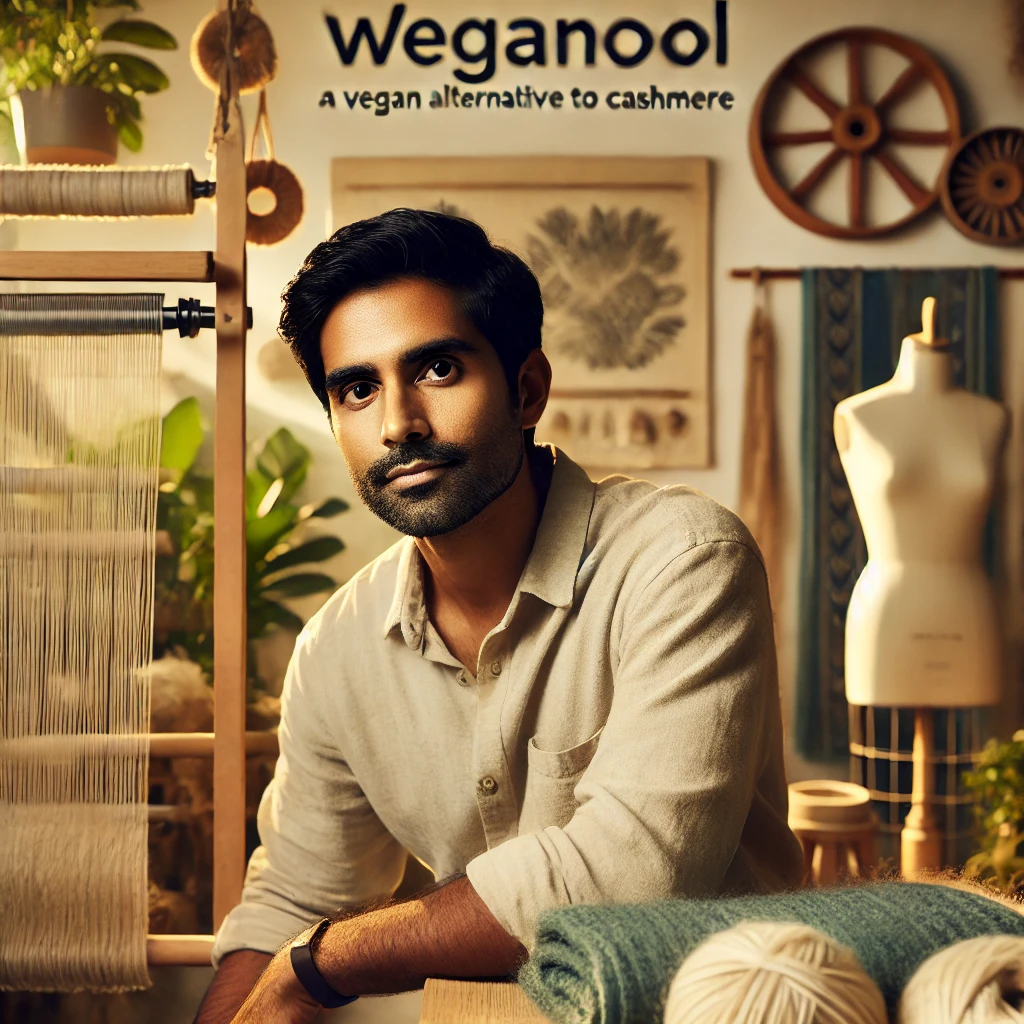
The textile industry has long relied on animal-derived fibres, but with sustainable alternatives gaining traction, innovative solutions are transforming fashion. One such revolutionary fabric is Weganool, a vegan substitute for cashmere created by Gowri Shankar, an environmentalist and entrepreneur dedicated to eco-friendly textile production. Weganool offers an animal-free, sustainable option for those seeking soft, luxurious fabrics without the environmental impact and ethical concerns associated with traditional cashmere.
A Vision for Ethical and Sustainable Textiles
Gowri Shankar’s journey began with a mission to reduce the environmental impact of textile production and promote animal welfare. Traditional cashmere production, reliant on goats, leads to environmental degradation due to overgrazing, and it involves processes that can cause animal suffering. Determined to change this, Shankar explored plant-based alternatives that could replicate cashmere’s softness and warmth while aligning with vegan and eco-friendly principles.
Shankar developed Weganool as part of his broader vision to create textiles that respect the planet and all its inhabitants. Through his company, he aims to bridge the gap between luxury and sustainability, proving that fashion can be both stylish and responsible.
What Is Weganool?
Weganool is crafted from the fibres of the Calotropis plant, commonly known as the milkweed plant. Calotropis is a resilient, drought-tolerant plant that grows abundantly in arid regions, requiring no pesticides or extensive water use. This makes it an ideal crop for sustainable textile production, as it doesn’t compete with food crops or strain local water resources.
The process of creating Weganool involves extracting the soft fibres from the Calotropis plant and combining them with organic cotton, resulting in a material that mimics the texture and warmth of cashmere. Because the production process relies on regenerative agriculture and doesn’t involve any animal inputs, Weganool is a truly vegan and sustainable option for eco-conscious consumers.
The Benefits of Calotropis Fibre
Calotropis fibre is not only sustainable but also offers several unique benefits:
- Softness and Warmth: Weganool is lightweight, soft, and warm, similar to cashmere, making it ideal for winter clothing and accessories.
- Natural Pest Resistance: Calotropis plants are naturally pest-resistant, reducing the need for harmful pesticides and creating a safer environment for farmers.
- Minimal Water Usage: As a drought-tolerant plant, Calotropis requires significantly less water than other crops, making it a more sustainable choice for arid regions.
- Biodegradable: Weganool is biodegradable, unlike synthetic fibres, which can take centuries to break down.
By using Calotropis fibre, Shankar’s production process supports sustainability and lessens the ecological footprint of the textile industry.
Ethical Production and Community Impact
One of Shankar’s core values is supporting local communities and promoting ethical production. His enterprise sources Calotropis from local farmers, providing an additional income source for communities in arid regions. By working closely with these communities, Shankar ensures that the benefits of Weganool’s production extend beyond environmental impact, creating social and economic benefits as well.
Additionally, the production process involves fair wages, safe working conditions, and empowerment for local artisans, aligning with ethical labour standards. Shankar’s approach not only champions sustainability but also fosters economic growth for underprivileged communities, making Weganool a fabric with a positive impact on all fronts.
A Growing Market for Vegan Textiles
The demand for vegan and sustainable alternatives in fashion is growing as consumers become more conscious of their environmental and ethical choices. Weganool addresses this demand by offering a plant-based alternative that rivals cashmere in quality. With an increasing number of brands looking to reduce their environmental impact and appeal to eco-conscious shoppers, Shankar’s innovative fabric is a timely and valuable addition to the industry.
Weganool’s popularity demonstrates a shift in consumer mindset towards sustainable luxury, paving the way for more innovations in eco-friendly textiles. The potential applications of Weganool are vast, from clothing and scarves to home textiles, allowing the fabric to replace animal-based products in various sectors.
The Future of Weganool and Sustainable Fashion
Gowri Shankar’s journey with Weganool reflects a larger trend in the fashion industry: a movement towards sustainable and ethical production methods. By creating a product that respects both the planet and animal welfare, Shankar is redefining what luxury in fashion means. Weganool’s success highlights the possibilities that arise when innovation meets environmental stewardship, offering a promising outlook for the future of fashion.
For those looking to embrace ethical, eco-friendly textiles, Weganool provides a luxurious, sustainable alternative that makes a real impact. To learn more about Gowri Shankar’s journey and the future of vegan textiles, explore our full article on Weganool.
